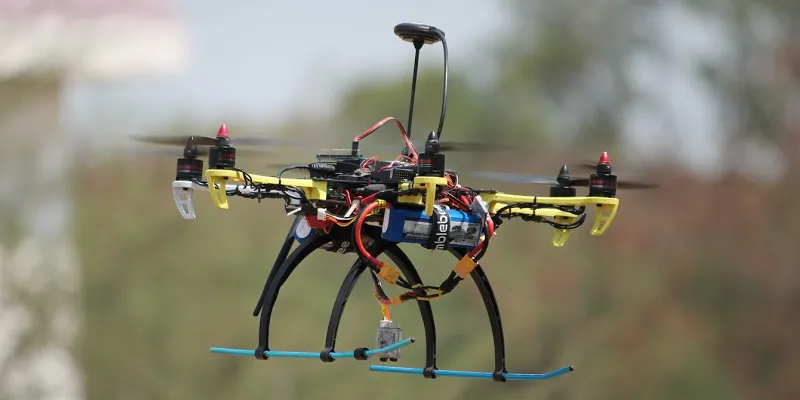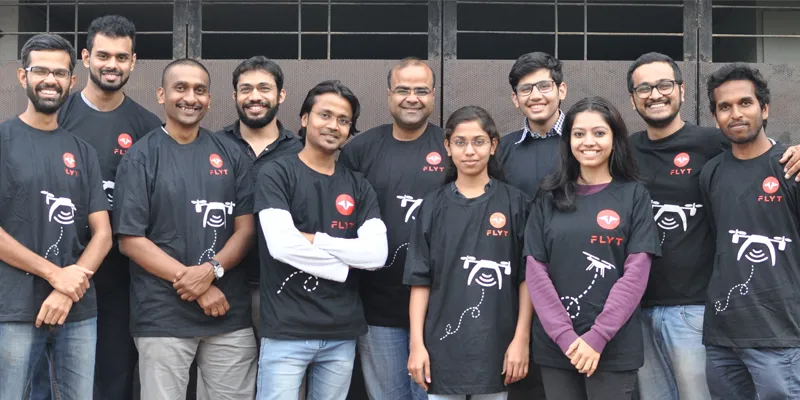
GenNext Hub
View Brand PublisherTwo growing startups – NavStik and Tagalys – share how a scalerator programme is aiding their growth
Mentorship key to building a global product business from India
In the last five years, advances in consumer electronics and accessibility have led to a greater interest in unmanned aerial vehicles, specifically drones. “While observing the transition, we realised that all drone-makers were facing a common set of problems and were being forced to reinvent the wheel. We saw an opportunity to build a platform that would help developers focus on solving the business problem, and leave the common or lower-level issues to the operating system,” says Nitin Gupta, Founder of NavStik.
From its inception in 2013, NavStik Labs has focussed on building technologies for drone automation. Its latest endeavour is a next generation development platform for commercial drone applications.

Navstik Labs is building an operating system for commercial drones (http://flytbase.com). “As drones are being used across a wide variety of areas, such as precision agriculture, surveys, industrial inspections and emergency deliveries, developers will need access to well-designed developers’ tools to accelerate the development of drone applications. And, we are addressing this need,” says Nitin, who has been working with drones for 15 years. Since their solution is compatible with the widest range of drones and hardware options, developers are able to integrate drones with their business applications and harness the true potential of this technology.
The founder says that the startup is deeply focused on serving the developer community.
“We are the only company worldwide offering a complete set of tools for commercial drone developers, from advanced flight computers, operating systems, APIs/SDKs, 3D simulators, to a repository of sample apps, online documentation, tutorial videos, etc”.
After successfully conducting a beta programme for its platform, NavStik has already started shipping its product to beta customers across more than 12 countries.
However, it has not been all smooth sailing. According to Nitin,
“The key challenge has been convincing people that a global product company building a ‘platform’ layer for an emerging market, can be based out of India.” He elaborates, “People would appreciate the work and vision, but still would not back us in real terms.
It took a lot of focused effort to not only build an innovative global product, but also demonstrate traction from customers across the world.” But things looked up once their customers and global industry leaders endorsed their work.

The fact that they were able to find mentors who built global businesses from India helped them immensely. “Not only did they give us a lot of strategic advice and mentorship, they also decided to become our angel investors.” And with growth, the team knew they could do so much more if they were better connected with industry leaders and startup mentors. That is among the many reasons why the startup was keen on being part of the GenNext Hub Scalerator programme. And that choice has proved to be beneficial in multiple ways.
Nitin explains, “We learnt about the common challenges that startups face and frameworks that can help address them. For example, in one of the sessions, we learnt about the various traction channels and how to identify and leverage the channels that work for different kinds of businesses. Successful entrepreneurs, mentors and investors shared a lot of wisdom, which is otherwise hard to get.”
The GenNext Hub team arranged periodic meetings and discussions with various stakeholders within Reliance, as well as industry leaders and mentors. “The GenNext Hub team spent long hours in closely mentoring us, helping us think through and refine our business plan, investor deck and the overall strategy.”
All this helped the startup “put a structure to madness”. The founder says, “We learnt how to prioritise our effort to convert an idea into a viable business. We learnt techniques and frameworks for growth hacking and scaling the idea once it is validated.” After integrating a number of frameworks that they learnt during the programme into their everyday work, the team says they are “now better equipped to measure the progress of their business, plan product-development, and manage customer relationships.” They’ve also identified new focus areas and revenue streams.
Today, NavStik is working towards reaching out to the next 200+ customers and building partnerships with global industry players, and hopes to change the perception that it is challenging to build a global product business out of India.
Hallway conversations that triggered a vision on how to disrupt the global market
In mid-2013, Palaniappan Chellapan and Antony Kattukaran started a B2C startup in the social commerce space. However, changing market conditions made it a high cash burn sector with no sight of profitability, which meant that they had to shelve their venture.

Not ones to give up, in late 2014 the duo once again started up with Tagalys. Two years on, Tagalys is helping e-commerce companies improve profitability and maximise their revenues by personalising visitor engagement across categories such as site search, listing pages and recommendations at a fraction of the cost it would take retailers to build and maintain the same capability internally. Co-founder Antony says, “We learn from visitors’ shopping behaviour and personalise product discovery to improve the click-through rate (CTR), from impressions to product pages.”
The founders' depth of experience in e-commerce and retail has been critical in building algorithms that have helped improve e-commerce conversion rates for Tagalys-powered channels (search, listing pages or recommendations) by 40 per cent to 130 per cent across verticals like food, home décor, apparel, jewellery, building materials, and others.” He adds, “Increased CTR means more visitors are viewing products and not leaving the listing pages. As more visitors view product pages, it increases the probability of sale or conversion rate. Most retailers today struggle as visitors come in, go to a listing page and since they don’t find products that appeal to them, leave the site. Industry observations state that more than half the visitors leave a site in the first 15 seconds. The fact that we can increase CTR or make visitors view products, has helped us increase conversion rates.”
Being a young startup, the early days were challenging for Tagalys, and the biggest challenge was “prioritising the product roadmap”. Palaniappan says, “We felt almost everything was important. Also, pricing was a huge mystery. We didn’t know how to hit the sweet spot.”
But, much of this has changed today. After graduating from the GenNext Hub Scalerator programme, the startup has been incorporating learnings from the programme to decide what and when to build.
Antony says, “Our product roadmap and sales channels have been most influenced by these learnings. A lot of the hallway conversations and workshops have gone into shaping a long-term vision on how we can disrupt the global market we are competing in. More importantly, these and many other key takeaways have been embedded in our DNA, and will help us grow in the future.”
Sharing more about their ‘Scalerator’ experience, Palaniappan says, “In hindsight, getting into the Scalerator was the easy part. The programme requires one to invest significant amount of time and effort to make the most of it. But that said, the entire experience has been helpful in many ways. For one, having an awesome but lean team meant that we didn’t have the luxury of diverse opinions. But at GenNext Hub, interacting with the team and other founders meant that we could get feedback on most of the challenges we faced. Also, the mentors ask questions to which you may not have very convincing answers. As founders, we do not always have answers to all questions nor do we think about all the questions relevant to the business.” The programme helped them focus on how they could come up with answers to such difficult questions.
The bootstrapped startup has received two commitments for investment, but the team says, “We have a few hypotheses to validate, to be sure that we can far exceed market expectations of returns in the shortest span of time. Being bootstrapped has helped us think differently and become more cost-efficient. We can now do a whole lot more with a whole lot less.”
Where does the startup see itself in the near future?
“In the short term, we will be focusing on India as it is a great market, easy to access, with high growth and a lot of customer feedback. In the long term, we will be expanding our offering and addressing a larger international market,” say the co-founders brimming with confidence.
As part of its four-month long immersive programme, GenNext Hub gives chosen startups access to funding, business mentors, technical and design experts, plug-and-play office space and other resources and thereby enables startups achieve scale.







